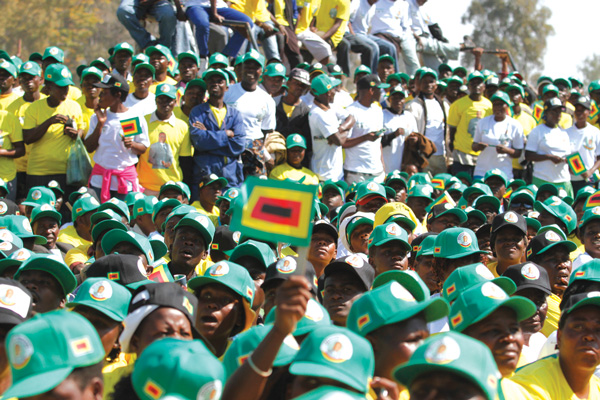
The ritual to endorse President Robert Mugabe as the Zanu PF leader ahead of the party’s annual conference in December is already underway, but analysts say this time around overzealous members are showing a lack of understanding of the party’s constitution.
By Everson Mushava
The Zanu PF’s conference to be held in Victoria Falls between December 7 and 13 will not be elective.

At the last congress held in Harare, the party tweaked its constitution to ensure that Mugabe unilaterally makes all senior appointments, including that of members of the presidium, making the endorsements by provinces useless.
However, Zanu PF structures have been trying to outdo each other in endorsing Mugabe and his two deputies Emmerson Mnangagwa and Phelekezela Mphoko.
Harare-based political analyst Ibbo Mandaza said the endorsements showed the desperate levels of jostling in the ruling party and the degree of constitutional ignorance among Zanu PF structures.
Mandaza said the endorsements were also factional statements aimed at propping up sectional agendas as the race to succeed Mugabe hots up.
- Chamisa under fire over US$120K donation
- Mavhunga puts DeMbare into Chibuku quarterfinals
- Pension funds bet on Cabora Bassa oilfields
- Councils defy govt fire tender directive
Keep Reading
“How do you endorse someone who was appointed by the president? The two vice-presidents were not elected, but appointed by Mugabe,” he pointed out.
“Furthermore, this is a conference, and not a congress; it is not elective.
“Zanu PF will only have another congress in 2019.
“A conference can only endorse the president who was elected at a congress when elections are held before another congress.
“Elections will be held in 2018 and so the conference of 2017 can resolve that Mugabe is the candidate.”
Mandaza said the confusion was emanating from changes made on the Zanu PF constitution last year to deal with former Vice-President Joice Mujuru’s faction that had been accused of trying to topple Mugabe.
“Most people still think vice-presidents are elected by provinces, as was the case before the amendments,” he said.
Zanu PF provinces, Mandaza said, always made resolutions ahead of conferences, but what made this year’s resolutions different was that they had factional overtones.
After last week’s endorsements, Zanu PF spokesperson Simon Khaya-Moyo, political commissar Saviour Kasukuwere, and secretary for administration Ignatius Chombo laboured to explain to party supporters that the December meeting was a conference, and not an elective congress.
According to the Zanu PF constitution, section 33.3, a conference should “declare the president of the party elected at congress as the state presidential candidate of the party,” apart from supervising and coordinating implementation of decisions and programmes of congress by the central committee.
Masvingo last week endorsed Mugabe, Mnangagwa and Mphoko, ignoring manoeuvres to thrust First Lady Grace Mugabe into the succession race.
The province maintained it only recognised her as the women’s league boss, despite increasing calls from some party members that she should succeed her husband.
Mashonaland West even went a step further and endorsed Mugabe as “life president”.
Another Harare-based political analyst, Takura Zhangazha said Zanu PF supporters did not understand the changes made on the constitution.
“Although the endorsement of Mnangagwa and Mphoko has no legal consequences, there are factional implications to show that the preferred successors indeed have support. There are factional assumptions that it will show who has popular support,” Zhangazha said.
Mnangagwa is often considered to be the front runner in the race to succeed Mugabe, but he is facing stiff competition from a faction called G40, reportedly fronted by Local Government minister Saviour Kasukuwere and Higher Education minister Jonathan Moyo, and working with Grace.
Alexander Rusero, a media studies lecturer said Zanu PF politics operated like a “delayed match” whose outcome is already known and the endorsements were an act of agenda setting ahead of the conference.
“They are in some way an act of pre-empting imaginary or real factional competition,” he said.
A fortnight ago, researcher Dereck Matyszak said the Zanu PF succession wars were being complicated by the fact that party members did not understand their constitution.
Mugabe’s succession has been a subject for speculation for a number of years and it was recently complicated by last year’s expulsion of Mujuru from the party and Grace’s entry into active politics.
Last week, Grace used a series of rallies to deny allegations she harbours ambitions to succeed her husband, but analysts say she cannot be ruled out of the race yet.











